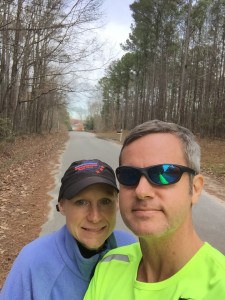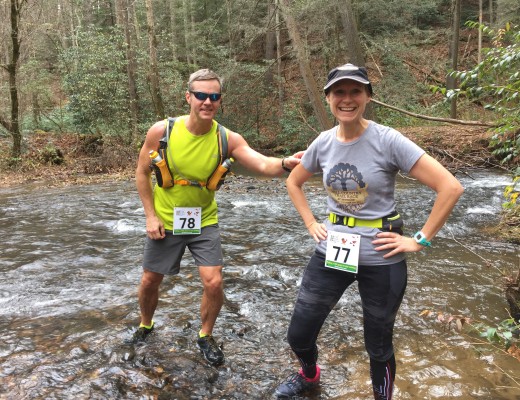The Power of the Daily Run
As runners most of us tend to be creatures of habit. I, like many of you, have my running favorites born of habit – the neighborhood 6-mile loop, the “standard” pace, my preferred time of day to run, and a pre-run ritual. Some performance-oriented runners may label these runs as junk miles. They claim you really need to focus on three key workouts (something we’ve covered in another article) and omit those runs that are neither fast enough or slow enough. Quite the contrary, I think there’s some overlooked benefits of “the daily run” and we’ll explore them in this article.
For purposes of this article, I’m going to define a “daily run” as your typical run, on your preferred local course, at your natural pace, done in your average time. A typical daily run is probably on a course that’s not too flat and not too hilly. Here in the Atlanta area where we live, it’s almost impossible to run a flat course unless it’s alongside a lake or river. On the other hand, we don’t live in the mountains, either. I can best characterize our area as rolling hills.
My natural pace is what I usually run when it’s not a recovery run or a speed workout. It’s brisk, but I could still talk if I was running with a partner. As I’ve gotten older, I find myself starting out slow for a mile or two to warm-up then I pick it up. My average, natural pace is about 45-60 seconds/mile slower than my current 5K pace. That same pace seems to work out the same for Mary Catherine based on her 5K. Your own natural pace may be faster or slower.
The daily run is habit-forming and it’s habit that reinforces the desire to do a daily run. That’s a good thing because it’s been said that there’s power in habits. One famous quote says:
Sow a thought, and you reap an act;
Sow an act, and you reap a habit;
Sow a habit, and you reap a character;
Sow a character, and you reap a destiny.– Samuel Smiles, “Self-Help”
If you want a solid, in depth look into habits and their importance, I recommend reading the book “The Power of Habit” by Charles Duhigg. There’s lots of great material in the book and we don’t have the space to cover it all in this article. One concept that seems very applicable to running is the concept of a “habit loop”. A habit loop begins with a cue (location, time, emotional state, other people) which in turn is followed by a routine (your daily run). The routine is reinforced by a reward (better health, faster performance, weight loss, etc). Repetition of the habit loop builds up anticipation for the reward. Understanding the cue helps trigger the habit loop all over again. An example of this for me would be:
- Cue – I’m home, it’s early, and I need to run before the day gets busy
- Habit – Go for my “daily run” of 6 miles
- Reward – I felt great and am ready to race that 5K this weekend
For me the habit loop of my daily run is just the process of getting and staying motivated on the road to my fitness and performance goals. Breaking this down a little further, here are some benefits that I see in the daily run:
- It serves as a home base – Most training programs encourage new runners to slowly progress until they can run continuously for 30-60 minutes. This is called “base building”, which has numerous physiological benefits to your body. Once you’ve built that base, it can be a familiar point from which you expand into faster or longer running, knowing that you can return back to “home base” when you need to.
- It’s a good benchmark – I use my daily run to help gauge my current performance level. I’ve been a runner long enough to tell when my daily runs naturally get faster, then I’m likely to race much faster. In fact, I can correlate specific average paces to certain expected racing times. Previously I said that my daily run is about 45-60 seconds/mile faster than my 5K pace. When the daily run gets faster, I can use the same math to estimate a likely finish time for a 5K.
- It helps re-establish consistency – if you fall out of your fitness routine, getting back on track might mean returning to home base (see #1 above) using daily runs – until running becomes familiar and comfortable again.
- It’s great for maintenance – during the holiday season, off-season or any other planned “down time” you can use daily runs to maintain your fitness.
- It helps build confidence – Knowing that I have a daily run I can knock out fairly easily, gives me confidence to try new paces, routes, and types of courses.
- It provides structure – As mentioned above, most training programs start with “base building”. Your daily run is the base from which other advanced running takes place. In short, the daily run provides structure to a well formulated training plan.
- It provides comfort – A daily run on a familiar course at a natural pace provides a familiar and comfortable place to be. If you’ve had a chaotic day, then let your daily run be your sanctuary.
- It provides release – Getting outside to breathe fresh air, catch some rays, and enjoy nature provides a natural release of tension and stress. Your daily run the perfect place and pace to do just that – enjoy running.
Another great quote about habit and routines is by Sean Covey who said, “We become what we repeatedly do”. If you want to be a runner, you must run. The daily run is a powerful habit-forming way to make running a positive force in your life.








